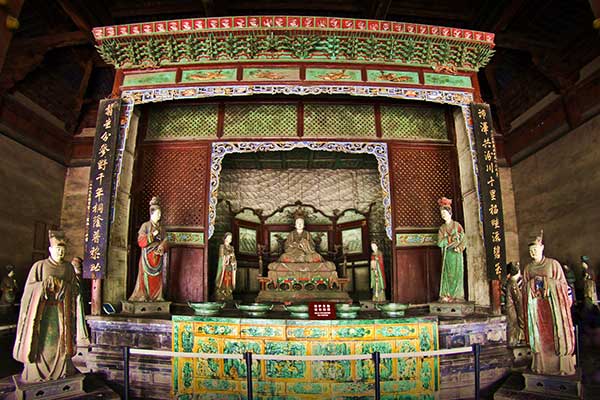 |
|
Yi Jiang sits on the altar.[Photo by Sun Ruisheng/China Daily]
|
The memorial hall of Yi Jiang, or holy water goddess, became the center of the temple after it was finished in the Song Dynasty (AD 960-1279). The prince's mother, Yi Jiang, because her son, husband and brothers were all excellent governors in the Zhou Dynasty, later became the icon that the people adored most. Local farmers also compared her to the water goddess, as her memorial hall was built on three springs and surrounded by man-made canals.
The main way leading to the hall's entrance is a stone bridge, which has a wing bridge on either side of it, forming a rare cross-bridge over the spring pond under it. Between the stone pillars and the bridge slate is thick wood of a special kind, like railway sleepers, that ensures all the space is effectively filled in, and prevents the effects of humidity's on the contact surfaces between stones.
The Yi Jiang hall is about five stories high, and was constructed with wood and tiles without using any single piece of iron. The architects used tenons and holes in the wood to fasten the structure, and made the wood into different parts of the house, according to the special properties of the various kinds of wood. The hall covers an area of about four basketball courts, and the grand overhanging cornice is supported by about 30 wooden pillars along its border. There is no single pillar in the hall, as all the weight is distributed to the border pillars through layers of complicated wood tenons between roof and pillar head.
On each of the eight front pillars is a wood-carved dragon twining around it, and every dragon has its own body gesture and designs. The height of the pillars varies, with the middle ones slightly shorter than the side ones, and all of the 30 pillars tilt slightly at their heads in the direction of the hall's center point, forming a stable frame. For more than 1,000 years, the hall has remained sturdy even after suffering dozens of earthquakes.
The entrance faces east, and the temple park can be divided into three parts - the north, the south, and the middle.
On the middle line, from the east to the west, are a drama stage, a canal bridge, four iron statuts of soldiers made in the Song Dynasty, an archway, a hall to store sacrifices, a bell tower, the stone bridge and the Yi Jiang hall.


























 Raymond Zhou:
Raymond Zhou: Pauline D Loh:
Pauline D Loh: Hot Pot
Hot Pot Eco China
Eco China China Dream
China Dream China Face
China Face






